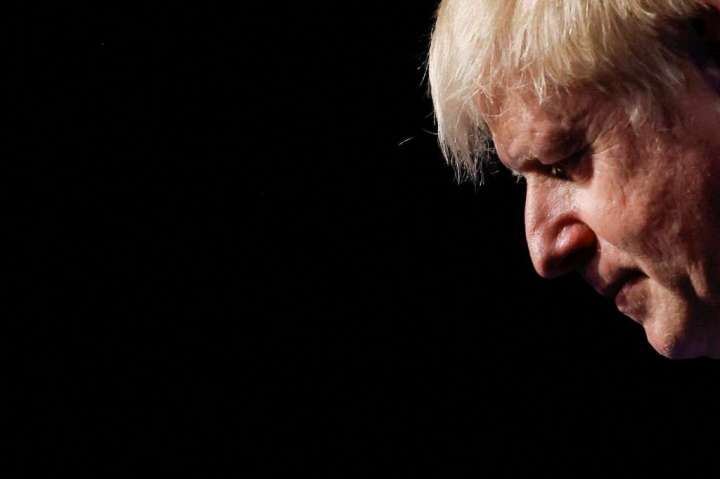LONDON — Boris Johnson has agreed to step down as the British prime minister, the BBC reported on Thursday, following an avalanche of resignations within his own government that eroded his authority and paralyzed the British government.
Boris Johnson expected to resign as party revolts, but plays for time

In fast-breaking news, Johnson has reportedly agreed to resign but hopes to stay in office until the autumn. During that time, the Conservative Party would pick a new prime minister to replace Johnson. There would be no general election.
There was immediate and fierce pushback to that idea from some lawmakers and party grandees who warned that Johnson was soiling the Conservative Party brand and that he was too damaged to stay in office through the summer.
Johnson’s former top aide and now chief critic, who helped his boss win the Brexit referendum and get elected, warned that the prime minister needed to go now. In a tweet, he urged the Conservative Party to “Evict TODAY or he’ll cause CARNAGE.” Cummings said that Johnson even now is playing for time and will try to stay on if he’s allowed to remain in office until the fall.
As the world watched the British government unravel, the defense secretary, Ben Wallace, stepped forward to assure Britons that they were being protected. Wallace tweeted: “A number National Security Ministers are directly involved in authorising, on a daily basis, operations to defend the UK & its citizens.”
Wallace added, “a number of us have an obligation to keep this country safe, no matter who is PM.”
Keir Starmer, the leader of the opposition Labour Party, said that this was “good news for the country,” but “we don’t need to change the Tory at the top — we need a proper change of government.”
It was unclear when exactly Johnson would give his address, but broadcasters, for hours on Thursday morning, pointed their cameras at the famous black door of 10 Downing Street, the prime minsters’s office, and waited for Johnson to step outside.
Johnson is not the first Conservative leader to have been shoved aside by his own party, which is famous for ditching its leaders quickly when they are no longer an asset. Even Winston Churchill resigned — after being given a gentle push — as his health declined in his later years.
Johnson’s predecessor, Theresa May, was forced out after she was unable to get her Brexit deal through Parliament following opposition within her own party, including from Johnson. May managed just over three years in office — Johnson has ruled for just under three years.
Johnson woke up Thursday morning in Downing Street, which is also his residence, to another wave of resignations by government officials and party members declaring that the embattled prime minister must step down immediately — for the sake not only of his Conservative Party but for the country.
Before the breakfast shows on television were over, there were 53 resignations, including four Cabinet ministers in just two days. Many of the letters included brutal assessments of Johnson’s tenure and critiques of his honesty. Some pleaded with him to go.
Nadhim Zahawi, who was appointed chancellor, the second-most important job in government, on Tuesday, turned on Johnson on Thursday and told him to step down. He tweeted: “Prime Minister: this is not sustainable and it will only get worse: for you, for the Conservative Party and most importantly of all the country. You must do the right thing and go now.”
Johnson had until now refused to bow to pressure to resign, saying that he has a 14-million-vote mandate from the British people, who cast their ballots for him and his party in the last general election in 2019.
But his authority has evaporated over the past 48 hours, with longtime colleagues and allies telling him to go — resignations seemed to be landing every few minutes.
There were so many resignations it became unclear that Johnson and his aides could fill the spots quickly enough to keep the government going. Ministers in charge of security, the courts, technology, education, finance, Northern Ireland and science have all left their jobs.
Northern Ireland Secretary Brandon Lewis was among those who resigned from his position in the Cabinet on Thursday morning. He said that the British government requires “honesty, integrity and mutual respect” and that it is “now past the point of no return.”
On Thursday morning, Suella Braverman, who hasn’t quit her job and serves in Johnson’s cabinet as the attorney general, said that “the facts are undeniable: he can’t command the confidence of sufficient numbers of people who serve in his government.”
She also said that she would run in a leadership contest to replace Johnson.
Damian Hinds, the departing security minister, told Johnson that “it shouldn’t take the resignation of dozens of colleagues, but for our country, and trust in our democracy, we must have a change of leadership.”
Johnson, who likes to quote Latin and refer to Roman history, faced a growing queue of Brutus impersonators.
The former Brexit minister, David Frost, told Johnson on the BBC that “the game is up.”
Frost said, “the government can’t continue, that’s very clear, and I hope the prime minister might have reflected overnight and come to that same conclusion himself.”
Some began to make comparisons to former U.S. president Donald Trump’s attempt to cling to power. Bernard Jenkin, a Conservative lawmaker and chair of the powerful Liaison Committee, told the national broadcaster that Johnson “can go with some dignity” or he can be “forced out like Donald Trump, clinging to power and pretending he’s won the election when he’s lost.”
Up until Thursday, Johnson had shrugged off calls for him to go. At a fiery session of the weekly Prime Minister’s Questions, he said: “Frankly, the job of a prime minister in difficult circumstances when you have been handed a colossal mandate is to keep going, and that’s what I’m going to do.”






